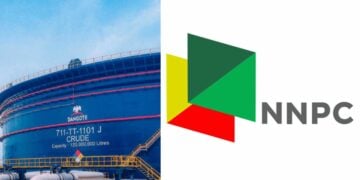When they rose from a one-day roundtable dialogue on national issues in Abuja to announce that Nigeria must increase its productivity and change consumption patterns to shore up the value of the naira, various speakers at the event that was organised by Development Specs Academy, sure spoke the mind of many people. They were right after all. Not a few economic experts had adduced to the fact that Nigeria’s surest path to turning the economy around is to agree on an actionable roadmap for its production or manufacturing sector to grow.
Speakers at the occasion including the convener, Dr Okey Ikechukwu, acknowledged that the Central Bank of Nigeria (CBN) has made several policy interventions to improve the value of the national currency, including the instrumentality of its well famous Anchor Borrowers Programme, which was created to enhance farmers’ access to loans, with a focus on meeting the local demand of farm products.
There’s a general agreement that for Nigeria or any country to give value to its national currency, improve the economy, raise standard of living and curb inflation, it must take serious measures to make sure it has a production-based economy. Not a few people believe that a productive, rather than a consuming economy is best for any nation that is ready to strengthen its local currency and save it from pressure of external factors.
As it stands, the Nigerian naira – like the economy – is highly susceptible to external shocks. The implication is that the value of the naira is largely determined by happening in international market including energy and food prices at the international market.
The country’s productivity – how successfully the economy transforms land, labor, capital and other inputs into goods and services – is low compared to peer countries, hindering economic growth, job creation, and living standards, a situation that has got the Central Bank of Nigeria restless to change the narrative.
For Sean Ross, a strategic adviser at 1031x.com, Investopedia contributor, and the founder and manager of Free Lances Ltd, the level of productivity is the most fundamental and important factor determining the standard of living. Raising it allows people to get what they want faster or get more in the same amount of time. Supply rises with productivity, which decreases real prices and increases real wages.
It is a common knowledge that productivity increases have enabled the U.S. business sector to produce nine times more goods and services since 1947 with a relatively small increase in hours worked. With growth in productivity, an economy is able to produce —and consume — increasingly more goods and services for the same amount of work.
Stressing that productivity is important in economics because it has an enormous impact on the standard of living, economic analyst, Stephen Kanabe said beyond job creation, corporations are able to access capital when the economy is flourishing and expands so they can spend and make investments and continue making profits.
When it comes to how to make the Nigerian economy a productive one, the Central Bank of Nigeria surely has a guidebook to follow. For instance, the apex bank has made many intervention schemes targeted at stimulating productivity in agriculture; manufacturing/industries; energy/infrastructure; healthcare; exports; and micro, small and medium enterprises (MSMEs). And those efforts are now helping to improve the value of the naira. Those who know say the CBN only needs the support of all to succeed in its drive to changing the nation’s economy status from a dump site for other countries to a productive economy.
Part of efforts to find homegrown solutions to the nation’s economic challenges, the Central Bank of Nigeria (CBN) and committee of all deposit money banks (Bankers’ committee) have announced a new programme tagged: “RT200 FX Programme” designed to ensure that Nigeria generates $200 billion from non-oil export annually. The RT200 FX programme is a set of policies, plans and programmes for non-oil exports that will enable Nigeria attain lofty yet attainable goal of $200 billion in forex repatriation, exclusively from non-oil exports, over the next 3-5 years.
Apart from that, between April and May 2022, the Bank released the sum of N57.91 billion under the Anchor Borrowers’ Programme (ABP) to 185,972 new projects for the cultivation of rice, wheat, and maize, bringing the cumulative disbursement under the Programme to N1.01 trillion, disbursed to over 4.2 million smallholder farmers cultivating 21 commodities across the country.
The Bank further disbursed the sum of N1.50 billion, under the Accelerated Agriculture Development Scheme (AADS), to one new youth-led project, piloted and funded through Ondo State government of for the acquisition of assets for oil-palm cultivation and the establishment of poultry farms. This brings the total disbursement under the Scheme to N21.23 billion for 10 state-led and three private sector-led projects.
In addition, official figures showed that the Bank released N21.73 billion to finance seven large-scale agricultural projects under the Commercial Agriculture Credit Scheme (CACS). The funds were utilized for the establishment of a ranch and milk processing facility; procurement of feed and medication for livestock/dairy production; construction of a 300 metric-tonne per day oil mill in Gusau, Zamfara State; acquisition and installation of an agrochemical factory; as well as purchase and stockpiling of homegrown maize for animal feed production. This brings the cumulative disbursement under this Scheme to N741.05 billion for 674 projects in agro-production and agro-processing.
Under the Paddy Aggregation Scheme (PAS), N6.20 billion was disbursed by the CBN to three new projects for the purchase and mopping-up of home-grown rice paddy. This brings the total funds disbursed to 42 integrated rice millers under the PAS to N106.39 billion.
To support the growth of the manufacturing sector, the Bank disbursed the sum of N436.85 billion to 34 new projects under the N1 trillion Real Sector Support Facility (RSSF). This was utilized for both greenfield (new) and brownfield (expansion) projects under the COVID-19 Intervention for the Manufacturing Sector (CIMS) and the Real Sector Support Facility from Differentiated Cash Reserve Requirement (RSSF-DCRR). Cumulative disbursement under the RSSF for the financing of 402 real sector projects across the country, currently stands at N2.1 trillion.
The Bank disbursed N55.34 billion, under the 100 for 100 Policy on Production and Productivity (100 for100 PPP), to 44 projects, comprising 24 in manufacturing, 17 in agriculture, 2 in healthcare, and 1 in the services sector.
In the healthcare sector, the Bank disbursed N17.70 billion to four healthcare projects under the Healthcare Sector Intervention Facility (HSIF), bringing the cumulative disbursements to N130.49 billion for 126 projects, comprising 58 hospitals, 31 pharmaceuticals and 37 other healthcare services.
The Bank released the sum of N21.00 billion Under the Export Facilitation Initiative (EFI), for three (3) projects in domestic production and value addition of cocoa and sesame seed. This intervention is targeted at further expansion of the economy’s non-oil export basket towards improving foreign exchange revenue earnings for the country.
To support micro, small and medium enterprises (MSMEs), the Bank disbursed N1.50 billion to 2,718 new projects through the Agri-Business Small and Medium Enterprises Investment Scheme (AgSMEIS) for activities in fish farming, rice processing, wheat farming, poultry farming, livestock farming, ICT and tailoring amongst others. This brings the cumulative disbursements under AgSMEIS to N136.13 billion.
Under the Micro, Small, and Medium Enterprises Development Fund (MSMEDF), the Bank disbursed N2.79 billion to support youths engaged at various nodes of the agricultural value chain, bringing the total disbursement under this intervention to N98.88 billion to 749 MSME projects across the country.
In energy/infrastructure, the Bank released N15.71 billion to power sector players including generation companies (GenCos) and gas companies (GasCos), under the Nigeria Bulk Electricity Trading Plc – Payment Assurance Facility (NBETPAF), bringing the cumulative disbursement under the facility to N1.30 trillion. The sum of N22.67 billion was also released to Distribution Companies (DisCos) for their Operational Expenditure (OpEx) and Capital Expenditure (CapEx), under the Nigeria Electricity Market Stabilisation Facility – Phase 2 (NEMSF-2). Cumulative disbursement under the NEMSF-2 currently stands at N251.93 billion.
Additionally, under the National Mass Metering Programme (NMMP), the Bank has disbursed N0.19 billion to DisCos for the procurement of electricity meters, bringing the cumulative disbursement for the procurement and installation of 865,956 meters across the country to N47.82 billion. Interventions in energy/infrastructure are designed to improve investment and develop enabling infrastructure in the Nigeria Electricity Supply Industry.
That is why experts say the fiscal authorities and indeed, all Nigerians must support the Central Bank of Nigeria’s efforts that are aimed at encouraging value addition to products originating from Nigeria to meet the demand of the domestic market and export to other countries.
Those who belong to that clique say the fiscal authorities can, for instance, support the CBN’s efforts by ensure that the shortage in the supply chain as a result of the rising insecurity across the country (that has forced many farmers out of their farms) is curtailed. The rise in insecurity putting unsustainable upward pressure on price levels, jacking inflation figure to 16.82 per cent in April.
The experts also hold the view that besides reigning in on inflation, security the farmers and their farm lands would allow the interventions of the CBN in agriculture to achieve the intended result of massive job creation while saving Nigeria of impending food security crisis.
Those who spoke with our correspondent on the issue said the Nigeria Customs Service and other security agencies with the mandate of manning the nation’s borderlines are up to their responsibilities by ensuring that smugglers do not undermine the efforts of the Central Bank and erode the gains so far.





